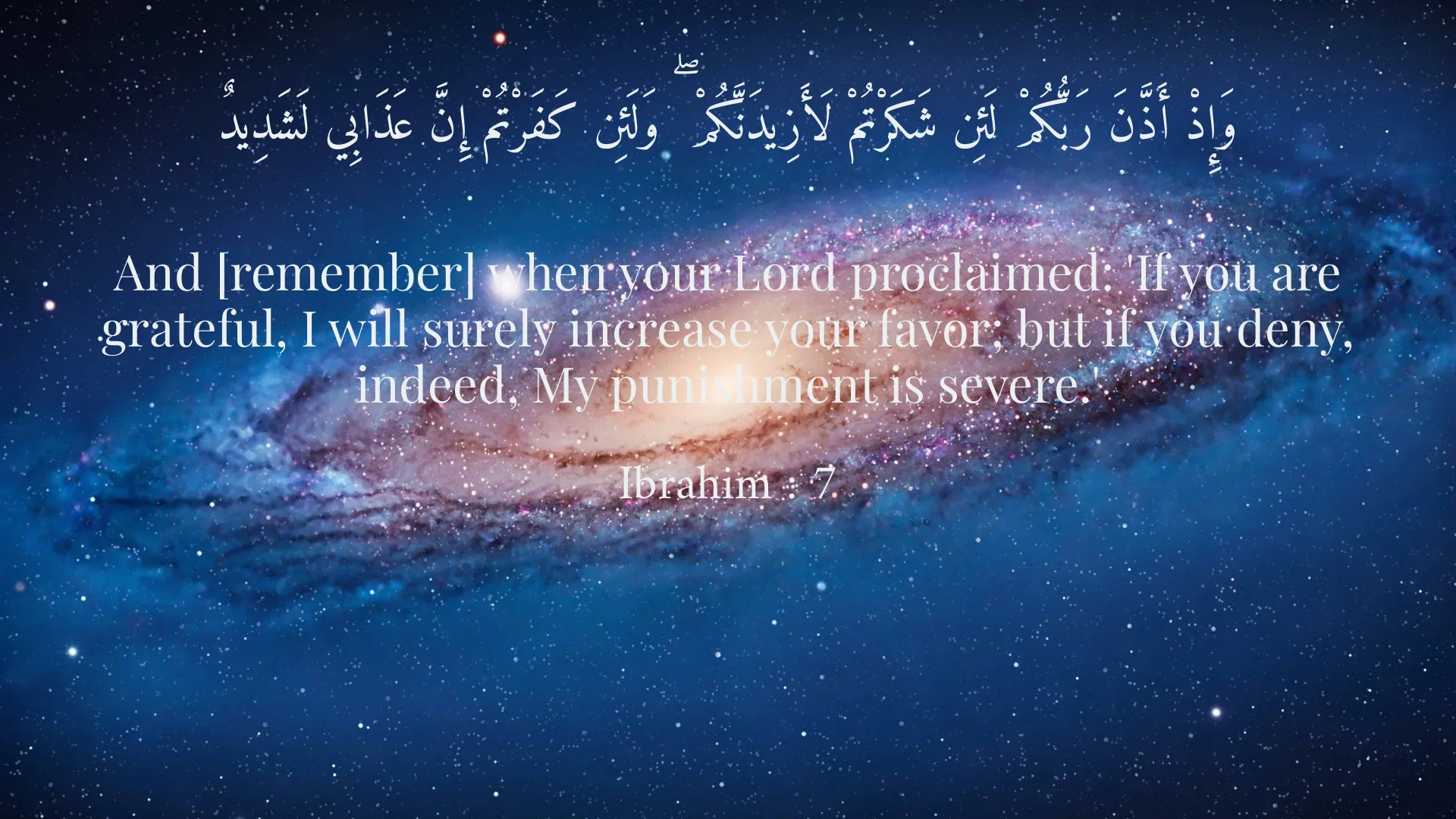Quranic Answer

Gratitude is a profound theme that is consistently emphasized throughout the Holy Quran. It serves as a reminder of the blessings bestowed upon humanity and encourages individuals to recognize and appreciate these gifts. One of the pivotal verses that elucidates this principle is found in Surah Ibrahim, verse 7, where Allah proclaims: 'And [remember] when your Lord proclaimed: 'If you are grateful, I will surely increase your favor; but if you deny, indeed, My punishment is severe.' This verse highlights an important spiritual transaction: it establishes a direct relationship between gratitude and the increase in divine blessings. The promise made by Allah indicates that gratitude is rewarded and serves as a catalyst for further goodness in one’s life. Gratitude, as mentioned in this verse, extends beyond mere words; it embodies a profound act of worship that involves the heart, mind, and soul. It reflects a positive psychological state that not only uplifts individuals but also enhances their overall morale and quality of life. Numerous studies have demonstrated that individuals who practice gratitude on a regular basis experience higher levels of happiness and contentment. In addition to the verse from Surah Ibrahim, Surah Al-Baqarah, verse 152 reinforces the importance of gratitude. The verse states: 'So remember Me; I will remember you.' Here, the act of remembering Allah is intricately linked with the act of gratitude. When individuals take time to reflect on their blessings and express gratitude, they strengthen their connection with the divine. This relationship fosters a sense of security and tranquility, as individuals are reminded of Allah’s presence in their lives. The concept of gratitude is a powerful tool in the human experience, influencing not just the spiritual aspect of life but also impacting psychological well-being. In moments of hardship, expressing gratitude may seem challenging; however, it is during these times that gratitude can lead to significant personal growth. Recognizing the silver linings, even in difficult circumstances, allows individuals to maintain a positive outlook and fosters resilience. Moreover, the Quran emphasizes gratitude as a continuous practice that should be ingrained in the lives of believers. Surah Az-Zumar, verse 66 states: 'But worship Allah and be among the grateful.' This directive not only encourages worship but also establishes gratitude as a fundamental aspect of worship itself. By being grateful, individuals remain aware of Allah’s existence and generosity, which inspires them to lead more purposeful and meaningful lives. This awareness can transform daily routines into acts of worship, as mundane activities become opportunities to express thanks. The psychological effects of gratitude are profound, enhancing emotional well-being, increasing satisfaction in relationships, and fostering a sense of community. Research has shown that individuals who regularly practice gratitude tend to experience lower levels of depression and anxiety, and higher levels of positive emotions, life satisfaction, and empathy. The act of writing down what one is grateful for or verbally expressing thanks can create a shift in perspective, leading to increased resilience in challenging situations. Furthermore, gratitude encourages individuals to connect with others and recognize the efforts and sacrifices made by those around them. In expressing gratitude towards others, individuals foster stronger relationships and create a network of support that can be invaluable during tough times. Gratitude paves the way for positive interactions and helps build a sense of belonging within communities. The Quranic teachings on gratitude highlight not only the relationship between Allah and His creation but also the importance of interpersonal connections, as gratitude nurtures relationships with family, friends, and society at large. Practicing gratitude is also a way of acknowledging the myriad of blessings that often go unnoticed in the hustle and bustle of daily life. From the simple pleasures, such as a warm meal or a kind word, to the more profound blessings like health, family, and faith, recognizing these gifts prompts individuals to celebrate life in its entirety. This celebration deepens the appreciation for life’s challenges and victories alike, fostering an attitude of hope and positivity. In conclusion, gratitude is not merely an occasional feeling but a lifestyle that can transform one’s perception of life. The Holy Quran provides compelling evidence of its importance through various verses, reminding believers of the endless cycle of blessings that come from acknowledging and appreciating what they have. The teachings encourage individuals to express gratitude openly, cultivating a continuous state of thankfulness that enhances not only their spiritual well-being but also their emotional and social connections with others. As individuals navigate the complexities of life, fostering a habit of gratitude becomes essential for maintaining love, peace, and connection with Allah and among themselves. By ingraining the practice of gratitude as a cornerstone of daily life, individuals pave the way for more fulfilling and joyful experiences. The journey of gratitude invites the light of divine blessings into one’s life and nurtures the spirit, ultimately leading to a more purpose-driven and harmonious existence.
Related Verses
وَإِذْ أَذَّنَ رَبُّكُمْ لَئِن شَكَرْتُمْ لَأَزِيدَنَّكُمْ ۖ وَلَئِن كَفَرْتُمْ إِنَّ عَذَابِي لَشَدِيدٌ
And [remember] when your Lord proclaimed: 'If you are grateful, I will surely increase your favor; but if you deny, indeed, My punishment is severe.'
Ibrahim : 7
فَاذْكُرُونِي أَذْكُرْكُمْ ۖ وَاشْكُرُوا لِي وَلَا تَكْفُرُونِ
So remember Me; I will remember you. And be grateful to Me and do not deny Me.
Al-Baqarah : 152
بَلْ أَعْبُدُوا اللَّهَ وَكُونُوا مِنَ الشَّاكِرِينَ
But worship Allah and be among the grateful.
Az-Zumar : 66
Short Story
One day, a man named Ali felt dissatisfied with his life and only focused on his problems. Then he remembered a Quranic verse stating: 'If you are grateful, your blessings will increase.' He decided to write down his blessings every morning and express gratitude to Allah. Over time, his spirit changed, and he felt a deep joy and tranquility in his life. Ali realized that gratitude could change his life and guide him towards light and happiness.